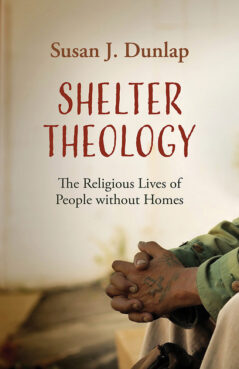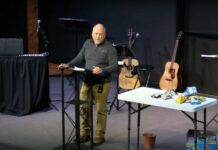You write that you were often surprised by their response of gratitude — even in the midst of unbearable violence, like a man who described his girlfriend being shot five times in the head.

“Shelter Theology” by Susan Dunlap. Courtesy image
Yeah. When he said, “I want to pray for my girlfriend who was shot five times in the head,” I was mute. Then I started hearing people saying, “Praise, God,” and “Thank you, Jesus.” They were grateful she was still alive. Unlike them, I don’t have a well-developed religious repertoire for responding to religious violence, and they do. My religious circles were reclaiming the importance of lament — my, God, my God, where are you? Theirs was a turn to gratitude. It focuses you on what is present rather than what is lacking. We know from studies that gratitude is life-sustaining.
You find that despite all their hardships, the people in the shelter who attended the prayer service continue to feel God guides and blesses them. How do you understand that?
(One man) described how God had a positive purpose for his life, which for the most part is teaching young people to avoid the mistakes he made. God had a purpose for what he experienced in prison, on the streets, without a home. It’s all drawn into a narrative of God’s abundant blessing and purposes no matter our present circumstances. Sleeping outside or living in a homeless shelter does not negate what God is doing for them.
You found that the people at the shelter frequently invoke the devil. Why?
It gives them language for profound social evil that they bear the brunt of. To attribute your failings to the devil is a way to deflect blame. To be poor in America, to be homeless, to live with a substance use disorder, to have survived violations as children, all these things create shame. It’s too excruciating to lay yet another blame on yourself, say if you relapsed. So it’s attributed to the devil. It’s a way to name a failing that does not add to the deep well of shame. If they want to call it the devil, they have more right to name that evil than I do. They live with the effects of it in the world. It’s the evil of neoliberal capitalism that has created circumstances that are dehumanizing, demeaning and ignores their pain.
You write that people without homes can teach more privileged people about God, that their faith can free us from bondage to idolatry. How so?
I think people who have lived without the privilege of whiteness or wealth know more about complete dependence on God than privileged people do. They have something to teach us — their practices of gratitude, their understanding of great evil, their trust that God will provide. I don’t want to romanticize the faith of the poor. They’re not purer, more righteous or more moral. But by dwelling in proximity to people on the margins we absorb habits of responding to God and depending on God and recognizing that all of life is dependent on God.
Going to the margins we do learn something about God that is not available anywhere else. Roberto Goizueta (a Cuban American theologian) said that “the margins are God’s privileged locus of revelation in history.” I couldn’t agree more. There is a particular knowledge of God that’s available there that isn’t available in other places.
You are not paid to hold these prayer services. Why do you do it, and why did you write this book?
I wanted to portray them as practical theologians. They take the theological material at hand: “No weapon formed against me shall prosper,” and “God will make a way out of no way.” They know how to skillfully match one of these sayings that hold multiple valences of meaning and match that with a particular concrete situation in someone’s life: Their kid is in prison. They can’t find a place to live. They slept outside last night. That capacity to match a saying to a situation is practical theology. I wanted to lift that up, to say this is practical theological reasoning.
But it’s also a plea for proximity. I want to help people understand we have to dwell on the margins — not as rescuers or fixers or helpers, but as equals before God who come together to pray. Novice pastoral caregivers think pastoral care means giving people orthodox and correct theological propositions to live by. But I wanted to develop a respect for theological worlds that have emerged out of suffering and persist because they continue to mediate the love and mercy and power of God.
This article originally appeared here.











